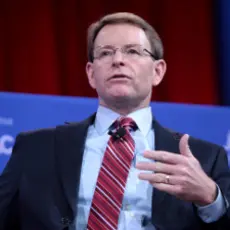Writing for the Weekly Standard website, Ryan T. Anderson complains that a religious group is “hijacking” the debate over SCHIP, the children’s health insurance program, whose reauthorization and expansion was recently vetoed by President Bush. Catholics United is running radio ads that criticize members of Congress who “say[ they’re] pro-life but vote[] against health care for poor children.” According to Anderson, the group stepped over a line:
Can't reasonable people of good will--including faithful Catholics--disagree about the wisdom of this bill? Not according to Catholics United, which presents the need to expand S-chip as if it were settled Catholic doctrine.
What this group has really done is to take its favored policy and baptize it in the name of the church. We can expect to see a lot more of this kind of thing in 2008, as Democrats search for religious voters and progressive religious organizations do the leg work. These groups claim to rise above the fray of partisanship, dedicating themselves to elevating the national conversation from the mud-slinging of the "religious right." But if you disagree with them about the prudence of this particular bill you're not really pro-life. Everything is now a moral issue. And there is no room for disagreement.
Anderson, a rising young conservative journalist, is assistant editor at First Things, the magazine founded by Richard John Neuhaus to counter the supposed exclusion of religious values from public policy debate. “Politics is in largest part a function of culture, and at the heart of culture is morality, and at the heart of morality is religion,” Neuhaus has said, adding, “It is frequently said that you cannot legislate morality. In fact, you cannot legislate anything but morality.”
So it seems more than a little discordant to read a Neuhaus protégé complaining that “Everything is now a moral issue” and that, when a group employs a value judgment apparently based on faith, “there is no room for disagreement.”
Anderson could have also taken notice this summer, when the Religious Right cranked up its creaky “pro-life” PR machine against SCHIP. As we pointed out in August, Tony Perkins of the Family Research Council claimed that the bill’s definition of “children” (beginning at birth rather than conception, thus making “unborn children” ineligible for coverage) was “a calculated move to open the door to federal taxpayer-funded abortions.” The National Right to Life Committee asserted that the bill would somehow create “rationing” in Medicare and thus “involuntary euthanasia.” And, hitting the trifecta, Focus on the Family warned that the bill did not restrict sex ed funding to abstinence-only programs.






